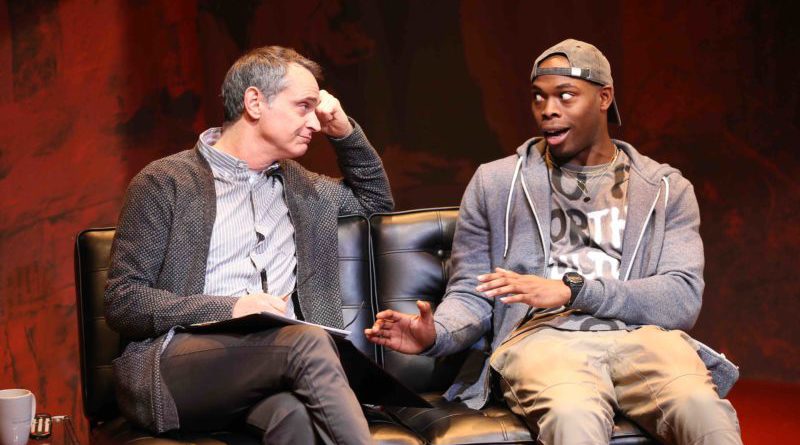INTERVIEW: 59E59 receives an ‘Education’ from Brian Dykstra
From left, Matthew Boston and Wesley T. Jones star in Brian Dykstra’s Education at 59E59 Theaters. Photo courtesy of Carol Rosegg / Provided by Karen Greco PR with permission.
Playwright Brian Dykstra’s new play is called Education, a fitting title for a show that explores the controversial debate about freedom of expression, boundaries of protected speech and the meeting of art and activism. The new production, currently playing 59E59 Theaters in Midtown Manhattan and produced by Sanguine Theatre Company, features Matthew Boston, Bruce Faulk, Wesley T. Jones, Elizabeth Meadows Rouse and Jane West. Margarett Perry directs the play, which runs through April 8.
In the show, a high school student faces suspension after attempting to burn an American flag as part of an art project. He befriends another student also in hot water over a controversial poem that was written. Together, the two team up for another project that will test the limits of expression in the school district.
Dykstra is best known for the plays Clean Alternatives, The Two of You and Strangerhorse. He’s also an HBO Def poet and actor, and has been produced by regional theater companies throughout the United States.
Recently, the playwright exchanged emails with Hollywood Soapbox about the new show. Questions and answers have been slightly edited for style.
Was there any particular news event or headline that inspired the premise of Education?
The earliest germ of the play came from a news story some years ago. A high school (and this is to the best of my recollection, mind you, it may not be strictly factual, but is my experience which formed the earliest impulse to write the play) … allowed their students time off so they could attend, as I recall, the Olympic torch relay. One student made a sign to hold up at the event. It read ‘Bong Hits 4 Jesus.’ The banner was confiscated, and the kid was suspended. I remember watching news coverage of the event. I remember the outrage expressed by local politicians, citizenry, and then more outrage from outside his town and state. It became a national story, which kept it knocking on the door of the kinds of things I find interesting enough to write plays about.
What came first the plot or the main characters?
For me both plot and character reveal themselves. So, if I don’t meet the characters quickly or fully enough, we never get to plot. By ‘we’ I mean the characters and I. I mean, I knew the story that inspired the play, so I had something to hang some of the actions on to. But until I have a handle on the psychology of the characters, there’s not much going on that moves anything forward beyond the conversation. Once I know more about the characters, I go back and re-write all the early scenes with that better understanding. So, the characters, for me, come first.
How was the rehearsal process? Were you actively involved?
Sadly, I was not actively involved. Or, not as involved as I am used to being. I was off in St. Louis acting in a production of The Humans at The Repertory Theatre of St. Louis. It is pretty rare for me to be away until tech week, but I knew I was leaving the play in the more-than-capable hands of a terrific director who understands my stuff really, really well.
Margarett Perry, take a bow. We had done all those readings that we all seem to have to do with anything in the theatre. The play was presented as a reading at a festival called PolitiKos with much the same cast, and we worked with this cast on the script before I left. So we had a little head start with them. I got rehearsal reports, questions from the director (although, not many) and the opportunity to re-write a thing or two, but I was less involved than normal, which reminds me that maybe I should leave directors (at least this particular director) alone more than I do.
How do you know the ideas behind Education are best presented as a play versus, say, a series of spoken poems?
I don’t really have an answer to that question. I’m a playwright. I’m a spoken word poet. Sometimes the scope of an issue is large enough to have a play hold it. Not that a poem isn’t large enough to hold anything, it is. But when disparate human psychologies need to collide for me to tell the story I want to tell, it has to be a play.
Why set the play in a small Ohio town?
It was important to me that it occur in a swing state. So for me, it is ‘a small town just outside a bigger (college) town in a Midwestern swing state.’ But I don’t think any of that is specified in the script. We came up with that language for this production.
By John Soltes / Publisher / John@HollywoodSoapbox.com
Education continues through April 8 at 59E59 Theaters in Midtown Manhattan. Click here for more information and tickets.

